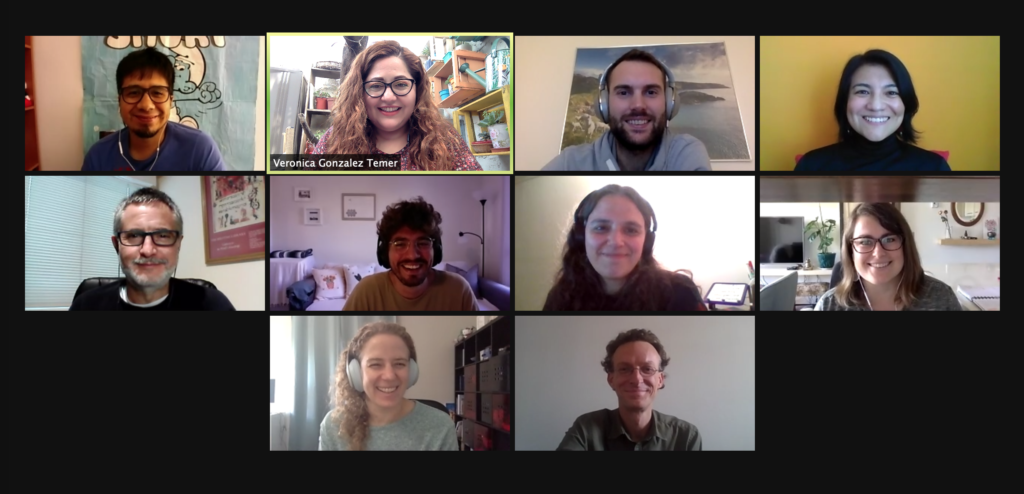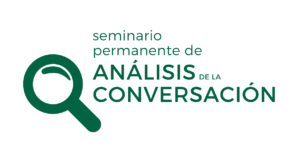A data session report by Verónica González Temer, UMCE; and Katherina Walper Gormáz, UAC.
[bg_collapse view=”button-red” color=”#ffffff” icon=”arrow” expand_text=”What’s a data session report?” collapse_text=”Hide this explanation” ]
Data sessions are a central feature of research in ethnomethodology (EM) and especially conversation analysis (CA). Although data session practices vary across institutions, fields, or even linguistic communities, the core idea remains the same; one or more participants makes a set of empirical data available to a group of people with shared research interests and they all contribute ideas, or alternative perspectives.
Even though the idea is always more or less the same, there are important differences in how people run data sessions, as well as challenges to be overcome. The Data session report will focus on the mechanics of data sessions across various institutional or linguistic contexts. Some of the questions we will be discussing are the following:
CALL FOR CONTRIBUTIONS
Data sessions all over the world foster communities of like-minded researchers and Data session report seeks to bring those communities together, creating room for discussions on how to make the most out of this amazing research practice. We invite you to share your data session experiences, tips or formats, or talk about specific challenges you have faced.
- How many times do people play a recording?
- How do they take turns?
- How are people invited?
- How open is a session and how are people who are not acculturated into data sessions encouraged to participate?
- How do people prepare transcripts?
- How do they deal with varied linguistic capacities in the room?
- How do presenters prepare transcripts for multi-lingual sessions? What kind of transcription conventions do they use? Are 3 line transcripts always effective? Etc.
Please email your contribution to pubs@conversationanalysis.org
[/bg_collapse]
The Permanent Seminar for Conversation Analysis (SPAC for its acronym in Spanish) was born in the middle of 2020 from the need to establish a community that brings together academics interested in working with Spanish interactions from a CA perspective. As part of their activities, they hold regular data sessions run entirely in Spanish.
The data sessions have three main aims (1) promoting the methodology of CA among Spanish speaking academics, (2) providing a space for analytical practice and learning in the study of social interaction, and (3) discussing the terminology for this type of analysis in Spanish. These aims arise from the need to establish a network where Spanish is the working language since most of those participating have been trained on CA in English-speaking institutions. Naturally, this will help expand the knowledge of CA to geographical places and academics that have not encountered this type of analytical perspective yet.
Two types of data session
SPAC holds two types of data sessions: training and extraordinary. The aim of the training sessions is to give participants the chance to enhance their analytical skills in the CA method. They make use of the TalkBank phone calls in Spanish. The transcripts follow Jeffersonian conventions and are prepared by a subsection of SPAC. These sessions, apart from providing the participants with training, also provide an opportunity to discuss Spanish translations for the concepts many of them have learnt in English. This practice enriches the understanding of the analytical concepts as they are unpacked and contrasted with other similar concepts that could be applied to the data being discussed. This is why the group benefits from having people with different levels of training and why it might be a good learning experience for those new to CA. An example that has come up in previous sessions is the possible translation of “response” and “answer”, two highly important terms used in CA, which in Spanish will necessarily be translated as “respuesta” and opens a debate about which of those concepts should be translated as “respuesta” and which word we would need to use for the other.
The second type, extraordinary sessions, focus on a specific phenomenon raised by one of the participants in the group. This person leads the session and guides participants to a specific portion or sequence of the data they might have gathered for a particular project. Sessions could also be held around emergent collections or preliminary analyses of interactional phenomena in Spanish. Generally speaking, these are the data sessions we all know and love. However, in this case and thanks to the context and participants, this type of session provides an instance for feedback and discussion with peers who understand the language, not only from a researcher’s perspective but also as users of the Spanish language.

What is the work dynamics in the data sessions?
In terms of the development of the session, they begin by sharing the data and the transcript and agreeing on the duration of the ‘viewing time’ which ranges from 10 to 15 minutes. As the Zoom platform is not always reliable and consistent to play video or audio (these tend not to play smoothly), each participant plays the data on their own computer, as many times as needed, and takes notes separately. During this ‘viewing time’ all participants mute their microphones on the Zoom platform and turn off their cameras. After the allotted time has passed, participants come back to the platform to share their insights on the data.Participants are encouraged to make a brief observation in an initial round so everyone has the chance to share ideas. Then, if there is a fragment that emerges as worthy of attention, the rest of the session is devoted to it. Otherwise, a line-by-line analysis is carried out focusing on sequential, operational, turn design and social action aspects, or on the position and composition of a single sequence or turn. It has also been the case that comparisons arise between similar phenomena in English and Spanish, as well as reference to relevant bibliography of the phenomena observed and similar cases from classic data.
When are the data sessions?
Data sessions are held on Tuesdays at 5:00 PM UTC every week. A calendar is available so participants can volunteer data for extraordinary sessions. The group is open to working with other types of interactional data in any variety of Spanish in ordinary or institutional contexts. SPAC are currently beginning to advertise the 2021 calendar so these data sessions will be interspersed with talks and basic training workshops on CA.
The group is open for anyone to join in: the only requisite is that you are willing to participate in Spanish. In fact, if you cannot attend regularly but would like to join in sporadically, this is perfectly fine.
The email to subscribe to the SPAC mailing list is the following:
mailto:conversanalista+subscribe@lists.ucla.edu
Once you have subscribed, you will receive the calendar of activities.


